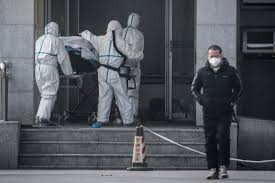The government of China just announced to take further steps to control the outbreak of coronavirus-related pneumonia. This form of pneumonia was just classified as an infectious disease in accordance with the law, as was decided at the State Council’s executive meeting chaired by Premier Li Keqiang on 20 January 2022.
The National Health Commission of the PRC issued announcement No. 1 on January 20, 2020 to classify pneumonia caused by infection of the novel coronavirus as a category B infectious disease according to the “Laws of the People’s Republic of China on the Prevention and Treatment of Infectious Diseases“”. However, China will take preventive and control measures of category A infectious diseases to effectively fight against this form of pneumonia. In line with this, the pneumonia has also been classified as a quarantinable disease at the borders according to the “Frontier Health and Quarantine Law of the People’s Republic of China.”

The recent meeting called for intensified inter-agency efforts to prevent the disease from spreading. It was decided in the meeting of 20 January that corresponding prevention and control measures will be launched to tackle the disease as a public health emergency.
The measures of prevention and control will be particularly stepped upin the city of Wuhan, where the markets concerned were shut down, wildlife control tightened, and fever screening made mandatory at airports, bus stations, train stations, and ports.
Local governments must, in accordance with their local conditions and capabilities, carry out ventilation, sterilization and temperature measures as needed in key venues and public transportation facilities. At the same time, the monitoring, pre-examination and triage of the disease must be enhanced to ensure that infections will be promptly detected and effectively contained and handled.
It was further decided at the meeting that high-caliber personnel and medical resources will be pooled in tackling the disease. Sufficient funding will be made available to provide patients, particularly those suffering from severe conditions, with the best possible care. The meeting urged tight control of infections at hospitals and precautionary measures for medical workers.
“All prevention and control measures needed must be duly delivered, and inter-agency efforts enhanced to ensure earliest possible detection, reporting, quarantine and treatment of the disease, and to keep the fatality rate at a minimal level. Precautions in hospitals should be strengthened,” Premier Li said.
“The government should make timely updates about the disease and be highly responsive to public concerns to shape an objective and rational public attitude towards the disease. We also need to keep the public better informed about how to protect themselves from winter infectious diseases,” he added.
The meeting required openness and transparency to keep the public informed of developments and to ensure prevention and control in a timely and objective manner. The meeting also called for closer communication and cooperation with the World Health Organization, the countries concerned, and the regions of Hong Kong, Macao and Taiwan.
“We must communicate and share information with international organizations and overseas. Research on the disease must be intensified to work out effective prevention and treatment. This way, our efforts may be more effective,” Premier Li said.

